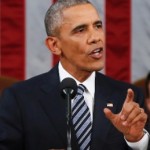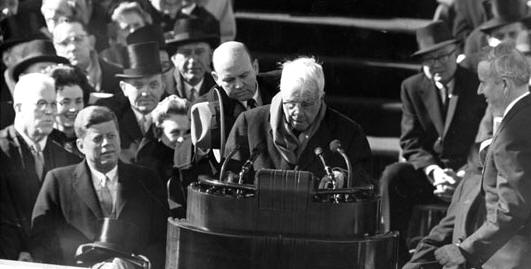Thursday
 The American Prospects’s Harold Meyerson recently explored whether Lincoln and FDR were better than President Obama at transcending partisan divides. This after the president speculated in Tuesday’s State of the Union Address that they would have handled the current polarization better than he has done. Meyerson concludes that they wouldn’t have done any better, in large part because they weren’t successful during their own presidencies. Meyerson quotes from Robert Frost’s “The Gift Outright” to emphasize just how difficult the task is.
The American Prospects’s Harold Meyerson recently explored whether Lincoln and FDR were better than President Obama at transcending partisan divides. This after the president speculated in Tuesday’s State of the Union Address that they would have handled the current polarization better than he has done. Meyerson concludes that they wouldn’t have done any better, in large part because they weren’t successful during their own presidencies. Meyerson quotes from Robert Frost’s “The Gift Outright” to emphasize just how difficult the task is.
Meyerson points out that Lincoln’s election triggered the Civil War—talk about polarizing!—and that Roosevelt could enact sweeping legislation only because he enjoyed “the most lopsidedly Democratic congresses in the nation’s history.” Both were excoriated by the opposition.
Obama has faced comparable attacks. Meyerson says that the red state-blue state divide, further exacerbated by Obama’s race, meant that “the odds that he could successfully reach across the aisle were essentially nil.” His soaring optimism upon entering the presidency has been worn down so that, by Tuesday night, he was warning against descending into tribalism. Here’s Meyerson:
If his State of the Union Address demonstrated anything, it’s that Barack Obama has a keener appreciation of American exceptionalism than any of his critics. He understands that this nation uniquely preceded the formation of its people, that, as Robert Frost wrote, “the land was ours before we were the land’s,” that what sets us apart as Americans is precisely that we don’t share a homogeneity of race or faith or country of origin, that because of that, our unity is an achievement, not a given, and our divisions, particularly of race, a constant danger. His curse has been that he has governed at a time when those divisions ran high and limited his capacity to create a better nation—though as he pointed out in last night’s speech, he’s accomplished a good deal within those constraints.
“The Gift Outright,” like most of Frost’s poems, is deceptive. While it might appear to be an embrace of Western Expansion and Manifest Destiny, it is not jingoistic. Pay particular attention to the line in parentheses:
The land was ours before we were the land’s.
She was our land more than a hundred years
Before we were her people. She was ours
In Massachusetts, in Virginia,
But we were England’s, still colonials,
Possessing what we still were unpossessed by,
Possessed by what we now no more possessed.
Something we were withholding made us weak
Until we found out that it was ourselves
We were withholding from our land of living,
And forthwith found salvation in surrender.
Such as we were we gave ourselves outright
(The deed of gift was many deeds of war)
To the land vaguely realizing westward,
But still unstoried, artless, unenhanced,
Such as she was, such as she would become.
The early colonists in Massachusetts and Virginia may have inhabited the land (“She was our land”), but America had not yet taken on the new identity that they would bestow. They thought of her rather as an extension of their English identities, which still possessed them.
Only when they gave themselves over entirely to the new land, when they became (psychologically) possessed by her and surrendered to her, did they become her people. The new land became the American experiment.
Unfortunately, the experiment included “deeds of war.” The first deed, I suppose, was the American Revolution, but there were others, including the Indian wars, the Mexican-American War, the threat of war against Canada (“Fifty-four Forty or Fight”), and the Spanish American War, which took us beyond the continent and into East Asia. We were indeed a “land vaguely realizing westward.”
The “deed of gift,” one scholar has noted, is probably a reference to Doctor Faustus signing his name in blood with Mephistophilis. In other words, possessing the land, with its hint of rape (or at least mastery), is something of a devil’s bargain. The America we love has been forged out of an ongoing and violent struggle.
I am reminded of cultural historian Richard Slotkin’s thesis that, time and again in its history, America has resorted to violence to regenerate itself–which is to say, to renew its sense of purpose. Slotkin discusses how the myth of the frontier grew out of this violence, and the “artless” land would be enhanced with stories of gunslingers and heroic pioneers. The land that Obama celebrated Tuesday night did not come easily.
This Obama well knows, as does Frost in his seemingly parenthetical aside about deeds. Here’s Obama describing the struggle that is required:
What I’m asking for is hard. It’s easier to be cynical; to accept that change isn’t possible, and politics is hopeless, and to believe that our voices and actions don’t matter. But if we give up now, then we forsake a better future. Those with money and power will gain greater control over the decisions that could send a young soldier to war, or allow another economic disaster, or roll back the equal rights and voting rights that generations of Americans have fought, even died, to secure. As frustration grows, there will be voices urging us to fall back into tribes, to scapegoat fellow citizens who don’t look like us, or pray like us, or vote like we do, or share the same background.
We can’t afford to go down that path. It won’t deliver the economy we want, or the security we want, but most of all, it contradicts everything that makes us the envy of the world.
So, my fellow Americans, whatever you may believe, whether you prefer one party or no party, our collective future depends on your willingness to uphold your obligations as a citizen. To vote. To speak out. To stand up for others, especially the weak, especially the vulnerable, knowing that each of us is only here because somebody, somewhere, stood up for us. To stay active in our public life so it reflects the goodness and decency and optimism that I see in the American people every single day.
It won’t be easy. Our brand of democracy is hard.
The land may be ours but we are still becoming the land’s. We can’t afford to withhold our hearts—Obama’s warns about cynicism—because that makes us weak. Rather, we must surrender and gives ourselves outright. If we do so, we will continue to realize westward, at least metaphorically, and we will continue to fill this evolving land with our stories and our art.
If we give ourselves outright, the land will return the gift to us tenfold.
